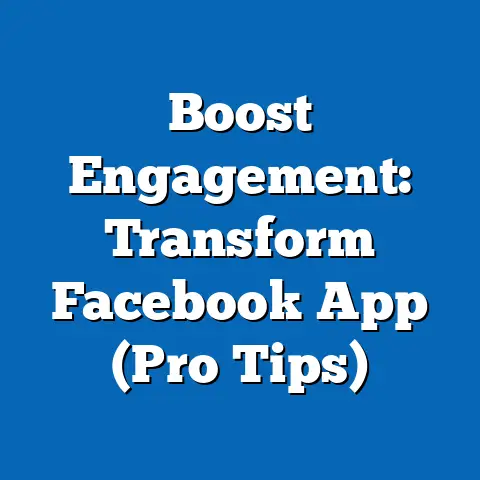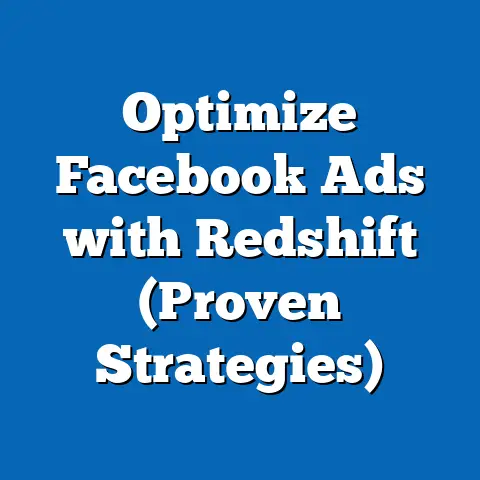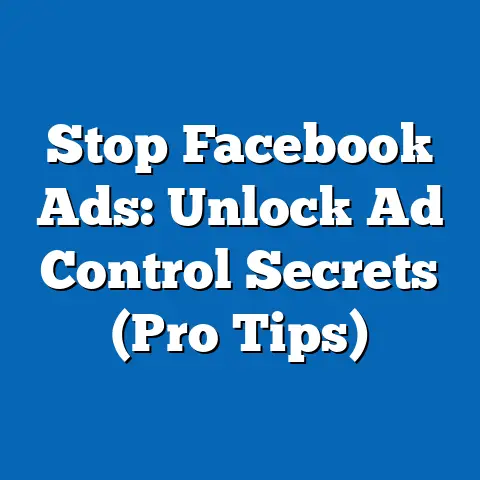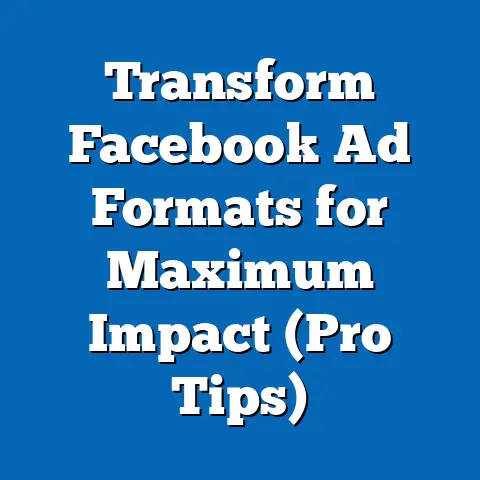Delete Facebook Ad Account Effortlessly (Expert Guide)
In the ever-evolving world of digital marketing, managing your online advertising accounts efficiently is crucial.
Platforms like Facebook offer incredible opportunities to reach a vast audience, but sometimes, the best move is to simplify and streamline your efforts.
Knowing how to delete a Facebook ad account when it’s no longer needed isn’t just about tidying up; it’s about maintaining control and focus over your advertising strategy.
I’ve been there – juggling multiple ad accounts, each with its own set of campaigns and data, and realizing that some were simply not serving my goals anymore.
That’s when I learned the importance of knowing how to gracefully close those accounts.
Digital marketers and business owners often find themselves in situations where they must pivot or restructure their advertising efforts.
Maybe you’re rebranding, shifting your target audience, or simply realizing that Facebook ads aren’t the right fit for your current strategy.
Whatever the reason, the ability to delete accounts efficiently becomes a crucial skill.
Understanding Facebook Ad Accounts
So, what exactly is a Facebook ad account?
Simply put, it’s your central hub for managing all your advertising activities on Facebook and Instagram (and the broader Meta network).
It’s where you create campaigns, define your target audience, set your budget, and track your results.
Think of it as your personal control panel for reaching millions of potential customers.
There are primarily two types of ad accounts:
- Personal Ad Accounts: These are automatically created when you join Facebook.
They’re generally suitable for individuals or very small businesses with simple advertising needs.
However, they often lack the robust features and scalability of a business ad account. - Business Ad Accounts: These are created through Facebook Business Manager (now Meta Business Suite).
They’re designed for businesses of all sizes and offer a wide range of features, including advanced targeting options, team collaboration tools, and detailed reporting.
These accounts all fit into the larger Facebook Ads Manager ecosystem.
Ads Manager is the interface where you manage your campaigns, ad sets, and individual ads.
It’s the central command center for all your Facebook advertising efforts.
There are many reasons why a business or individual might decide to delete an ad account.
Maybe you’re rebranding and want to start fresh with a new account that reflects your new brand identity.
Or perhaps you’re changing your marketing strategies and focusing on different platforms.
In some cases, a business might simply be closing down, rendering the ad account obsolete.
According to Statista, as of the first quarter of 2024, Facebook had over 10 million active advertisers.
This highlights the platform’s vast reach and the commonality of businesses using Facebook ads.
With so many advertisers, it’s inevitable that many will eventually need to delete or manage their ad accounts.
I’ve personally worked with clients who’ve needed to delete accounts due to everything from internal restructuring to a shift in marketing focus.
Key Takeaway: A Facebook ad account is your central hub for managing advertising activities.
Understanding the difference between personal and business ad accounts is crucial for effective advertising management.
Reasons to Delete a Facebook Ad Account
Deleting a Facebook ad account isn’t a decision to be taken lightly, but sometimes it’s the right move.
Here are some of the most common reasons why you might consider hitting that delete button:
- Financial Reasons: This is often the biggest driver.
Maybe your budget has been cut, and you can no longer justify the expense of running Facebook ads.
Or perhaps you’ve found that your ad spend is simply not generating a sufficient return on investment (ROI). - Ineffective Ad Performance and Poor ROI: Speaking of ROI, if your ads consistently underperform, despite your best efforts to optimize them, it might be time to cut your losses.
I’ve seen businesses pour money into Facebook ads with little to show for it, and sometimes, the most responsible decision is to stop the bleeding. - Change in Marketing Strategy or Business Focus: As businesses evolve, their marketing strategies often change.
Maybe you’re shifting your focus to a different platform, like TikTok or LinkedIn, or you’re adopting a completely different approach, like content marketing or SEO. - Privacy Concerns or Dissatisfaction with Platform Policies: In recent years, there’s been increasing scrutiny of Facebook’s data privacy policies.
If you’re uncomfortable with how Facebook collects and uses user data, you might choose to delete your ad account as a matter of principle. - Reducing Clutter and Simplifying Account Management: Sometimes, less is more.
If you have multiple ad accounts, some of which are inactive or underperforming, deleting them can help you streamline your operations and focus on what’s truly working.
I’ve found that a clean, organized Ads Manager can significantly improve my efficiency and reduce the risk of errors.
The potential benefits of deleting an account are clear.
It can free up your budget, simplify your account management, and align your advertising efforts with your current business goals.
I remember working with a small e-commerce business that was struggling to make Facebook ads work.
They were running multiple campaigns targeting different demographics, but none of them were generating significant sales.
After a thorough analysis, we realized that their target audience was simply not active on Facebook.
We made the difficult decision to delete their ad account and shift their focus to Google Ads, which proved to be a much better fit for their product and target market.
Key Takeaway: There are several valid reasons to delete a Facebook ad account, including financial constraints, poor performance, changing marketing strategies, privacy concerns, and the need for simplified account management.
1. Log into Your Facebook Account:
- First things first, head over to Facebook and log in with the account that has admin access to the ad account you want to delete.
- Once you’re logged in, navigate to Ads Manager.
You can do this by clicking on the “See all” dropdown menu on the left-hand side of your Facebook page and selecting “Ads Manager.”
2. Navigate to Account Settings:
- In Ads Manager, look for the “All Tools” menu (it’s usually represented by three horizontal lines or a gear icon).
Click on it. - From the dropdown menu, select “Ad Account Settings.” This will take you to the settings page for your ad account.
3. Initiate the Deletion Process:
- On the Ad Account Settings page, scroll down to the “Ad Account Status” section.
- You should see an option that says “Deactivate Ad Account.” Click on it.
4. Confirm Deletion:
- Facebook will now ask you to confirm your decision to deactivate the ad account.
It will also present you with a warning, reminding you that you won’t be able to run ads with this account once it’s deactivated. - Choose a reason for deactivating your account from the provided dropdown menu.
This helps Facebook understand why users are leaving the platform. - Click the “Deactivate Ad Account” button to proceed.
5. Final Steps:
- Facebook may ask you to enter your password to confirm your identity.
- Once you’ve entered your password and clicked “Confirm,” your ad account will be deactivated.
- Keep in mind that deactivation is not immediate.
Facebook may take some time to process your request.
Before you proceed with deletion, it’s crucial to ensure that all your campaigns are stopped and your budgets are settled.
Here’s why:
- Stopping Active Campaigns: If you don’t stop your campaigns, they will continue to run until your budget is exhausted, even after you’ve deactivated your ad account.
This can lead to unexpected charges and wasted ad spend. - Settling Budgets: Make sure you’ve paid any outstanding balances on your ad account.
If you have an unpaid balance, Facebook may prevent you from deleting your account until it’s settled.
I always recommend double-checking that everything is in order before hitting that delete button.
It’s a simple precaution that can save you a lot of headaches down the road.
Key Takeaway: Deleting a Facebook ad account involves logging in, navigating to account settings, initiating the deletion process, confirming your decision, and taking final steps.
Always ensure that all campaigns are stopped and budgets are settled before proceeding.
Common Pitfalls and Troubleshooting
Even with a clear guide, things can sometimes go wrong.
Here are some common pitfalls to watch out for when deleting your Facebook ad account:
- Forgetting to Cancel Active Campaigns: This is the most common mistake.
As I mentioned earlier, if you don’t stop your campaigns, they will continue to run, potentially racking up charges even after you’ve deactivated your account. - Confusing Ad Accounts with Business Accounts: It’s important to distinguish between your ad account and your Facebook Business Manager account.
Deleting your ad account will not delete your entire business account. - Having Outstanding Balances: If you have an unpaid balance on your ad account, Facebook may prevent you from deleting it until the balance is settled.
- Lack of Admin Access: You need to have admin access to the ad account in order to delete it.
If you don’t have the necessary permissions, you’ll need to contact the account administrator for assistance.
If you encounter issues during the deletion process, here are some troubleshooting tips:
- Check Your Internet Connection: Make sure you have a stable internet connection.
A weak or interrupted connection can sometimes cause errors. - Clear Your Browser Cache and Cookies: Sometimes, outdated data stored in your browser can interfere with the deletion process.
Clearing your cache and cookies can often resolve these issues. - Try a Different Browser: If you’re still having trouble, try using a different web browser.
- Contact Facebook Support: If all else fails, don’t hesitate to contact Facebook’s support team.
They can provide personalized assistance and help you resolve any technical issues you’re experiencing.
Here are some frequently asked questions (FAQs) related to account deletion:
- Q: Can I reactivate my ad account after deleting it?
- A: In most cases, yes.
However, it’s not always guaranteed.
Facebook may have certain restrictions or policies that prevent reactivation.
- A: In most cases, yes.
- Q: What happens to my ad data after I delete my account?
- A: Facebook’s data retention policies vary.
Some data may be permanently deleted, while other data may be retained for a certain period of time.
- A: Facebook’s data retention policies vary.
- Q: Will deleting my ad account affect my Facebook page?
- A: No, deleting your ad account will not affect your Facebook page.
Your page will remain active, and you can continue to use it as usual.
- A: No, deleting your ad account will not affect your Facebook page.
- A: In most cases, yes.
However, it’s not always guaranteed.
Facebook may have certain restrictions or policies that prevent reactivation.
- A: Facebook’s data retention policies vary.
Some data may be permanently deleted, while other data may be retained for a certain period of time.
- A: No, deleting your ad account will not affect your Facebook page.
Your page will remain active, and you can continue to use it as usual.
Key Takeaway: Be aware of common pitfalls like forgetting to cancel active campaigns, confusing ad accounts with business accounts, and having outstanding balances.
Troubleshooting tips include checking your internet connection, clearing your browser cache, and contacting Facebook support.
Alternatives to Deletion
Before you completely sever ties with your Facebook ad account, consider these alternatives:
- Pausing the Ad Account: Instead of deleting your account, you can simply pause it.
This will prevent any new ads from running, but it will preserve your account data and settings.
This is a good option if you think you might want to use the account again in the future. - Archiving Campaigns: If you have specific campaigns that are no longer relevant, you can archive them instead of deleting your entire account.
This will remove them from your active campaigns list, but it will still allow you to access their data in the future. - Lowering Your Budget: If financial constraints are your primary concern, consider lowering your budget instead of deleting your account.
This will allow you to continue running ads, but at a reduced cost.
I’ve seen businesses benefit from keeping their ad accounts active, even if they’re not currently running ads.
They can use the historical data to identify trends, track performance, and refine their targeting strategies.
Key Takeaway: Alternatives to deletion include pausing the ad account, archiving campaigns, and lowering your budget.
Keeping the account may be beneficial for maintaining historical data for future campaigns.
Conclusion
Deleting a Facebook ad account can seem daunting, but with this guide, you should be able to manage the process effortlessly.
Remember to follow the steps carefully, avoid common pitfalls, and consider alternatives before making a final decision.
By taking control of your advertising efforts, you can streamline your operations, optimize your budget, and achieve your business goals.
Digital marketing is all about adaptability.
Sometimes, the most strategic move is to let go of what’s not working and focus on what is.
Whether you choose to delete your ad account, pause it, or simply adjust your budget, the key is to make informed decisions that align with your overall marketing strategy.
So, go forth and take control of your Facebook advertising landscape!






